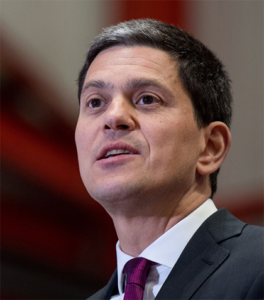Employing women refugees makes economic sense – Miliband
Women in fragile and conflict-affected areas are missing out on employment opportunities and often barred from working, according to the CEO of International Rescue Committee and former UK Foreign Secretary David Miliband.
 As the numbers of displaced people across the globe soars to more than 70 million, Mr Miliband has drawn attention to the even more parlous situation women refugees often find themselves in.
As the numbers of displaced people across the globe soars to more than 70 million, Mr Miliband has drawn attention to the even more parlous situation women refugees often find themselves in.
“Many refugees face restricted access to labour markets — they are often barred completely from working and earning an income. But women asylum seekers have it even harder: many women refugees face long-term poverty and high levels of sexual abuse,” Mr Miliband said, in a widely published opinion piece
In conflict-affected states, only about four in 10 women are in paid work, while seven in 10 men are.
“Helping refugees isn’t just morally right – it’s economically smart too – both for refugee hosting countries’ economic productivity and also for the safety and economic security of refugee women and their families,” Mr Miliband said.
He said that for refugee women, participation in the labour market was as low as 6 per cent in Germany, Jordan and Lebanon.
And when women do work, the gender pay gap magnifies the disadvantage with World Economic Forum data showing that just 63 per cent of the wage gap has been closed across the world.
Women, meanwhile, still spend double the time doing unpaid tasks, such as housework or child minding, compared to men.
“There is a chance for a win-win here – help women refugees while simultaneously addressing gender inequalities, including pay,” Mr Miliband said.
“As the UN High Commissioner of Refugees states clearly in its 2018 Global Compact on Refugees, enabling refugees to earn incomes is far better than giving them aid, as it creates self-reliance and choice,” he said.
“An income – and the very fact that women can go to work – often mitigates gender-based violence. Families are often better protected, too.
“For example, women refugees no longer have to rely on income from their children working on the streets. Instead, they can attend school,” Mr Miliband said.
A new report from the International Rescue Committee (IRC) and the Georgetown Institute for Women, Peace and Security (GIWPS) shows how economic benefits would flow if refugees – and particularly women – could access jobs.
The report found that refugee women could contribute up to $1.4 trillion annually to global GDP if employment and earnings gender gaps were closed in the 30 countries that host 90 per centre of the world’s refugees.
Closing these gaps for all refugees – by equalizing wages and employment rates between genders in these countries – could boost global GDP up to $2.5 trillion, the report said.
In the United States, the analysis suggests if women refugees were participating in the labour market at the rates of American males, they could contribute $1.6 billion to annual US gross domestic product.
Mr Miliband said the numbers were a call to action.
“A serious global agenda must include upholding opportunities for refugees to work by permitting labour market access, including self-employment, and increasing refugees’ access to decent work,” he said.
“That will only be possible if international economic institutions support countries like Turkey, Lebanon and Ethiopia in fulfilling their responsibilities to refugees as well as to their own populations.
“For example, Uganda was one of the first countries to receive economic support to help the country deliver on its promise to welcome and economically integrate millions of refugees. Uganda hosts the highest number of refugees in Africa and boasts one of the highest refugee employment rates, at 37%, right behind the United States at 40 per cent,” Mr Miliband said
His organisation, IRC, is calling for the establishment of a Global Refugee Women and Work Commission to help other countries follow Uganda’s lead, which would include donors, host governments, international organizations and the private sector.
“A good place to start is the selection process for a new IMF managing director. As the new IMF chief is selected, candidates must be asked to publicly declare whether they intend to continue Christine Lagarde’s work in the area of gender pay inequality, and specifically how they will address the issue of women refugees’ access to work,” Mr Miliband said.
“Taking on the injustice of unequal access to work for women refugees is an imperative in the global fight for gender equality. The stakes are just too high to fail,” he said.












